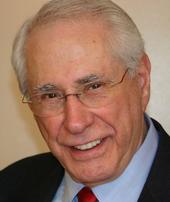Mike Gravel was born in Springfield, Massachusetts, to French Canadian immigrants. He attended French-speaking Catholic schools, and as a teenager, when he wasn’t working with his father and brothers in the house painting and construction business, he volunteered in local Springfield politics, developing an avid interest in governance and government.
In the early 1950s, Mike Gravel enlisted in the U.S. Army and served as adjutant in the Communications Intelligence Service and as a Special Agent in the Counter Intelligence Corps in Germany and France.
After graduating with a B.S. in economics from Columbia University, Mike Gravel moved to Alaska, where he built a real estate business. He served in the Alaska House of Representatives from 1963 to 1966, and was then elected to two terms in the U.S. Senate, representing Alaska from 1969 to 1981.
Senator Gravel served on the Finance, Interior, and Environment and Public Works committees, chairing the Energy, Water Resources, Buildings and Grounds, and the Environmental Pollution subcommittees. During the environmental watershed decade of the 1970s, he co-sponsored or co-authored every piece of meaningful Senate legislation dealing with air, water, waste and energy.
In 1971, as a freshman senator critical of the Vietnam War and of government secrecy, Mike Gravel used his position as a senator to release the “secret†Pentagon Papers and facilitated their publication as The Senator Gravel Edition, The Pentagon Papers, Beacon Press (1971). This publication occasioned litigation, Gravel v. U.S. Government, resulting in a landmark Supreme Court decision relative to the Speech and Debate Clause of the United States Constitution, establishing the precedent that members of Congress cannot be bound by the official secrets of any presidential administration.
Senator Gravel waged a successful lone filibuster for five months, ending the military draft in the United States. He forced an end to the undersea testing of obsolete nuclear warheads in the earthquake-prone area of Amchitka Island, Alaska, which could have compromised the food chain of the North Pacific. He also initiated the national and global critique of nuclear power generation.
Despite being opposed by both government entities and the oil industry, in 1973 Senator Gravel introduced the amendment to authorize the construction of the Alaska oil pipeline, building support and allies to secure passage of the amendment by a single vote. In addition to providing jobs and a wide array of economic benefits to citizens of Alaska, the pipeline has been responsible for providing 20 percent of the United States’ oil supply over the last generation.
PUBLIC LIFE
Senator Gravel’s business activities have encompassed real estate, finance, and energy. He also worked as a cab driver in New York City, as a clerk on Wall Street, and as a brakeman on the Alaska Railroad. Senator Gravel was the founding president of the Democracy Foundation, Philadelphia II, and Direct Democracy—nonprofit corporations dedicated to the establishment of direct democracy in the United States through the enactment by American voters of a federal ballot initiative called the National Initiative. The National Initiative will permit citizens to vote for or against policy issues that affect their lives. Senator Gravel lectures and writes about governance, capitalism, Social Security, tax reform, energy, environmental issues, and democracy. Books authored by Senator Gravel are Jobs and More Jobs and Citizen Power. He holds four honorary degrees in law and public affairs.Senator Gravel is married to Whitney Stewart Gravel and has two grown children: Martin Gravel, living in Colorado, and Lynne Gravel Mosier, living in California. The Gravels have four grandchildren: Renee, Alex, Madison and Mackenzie.
Senator Gravel announced his candidacy for the Democratic nomination in the 2008 presidential race on April 17, 2006. Subsequently, on March 25, 2008, Senator Gravel announced he would join the Libertarian Party. Senator Gravel's candidacy officially came to an end on May 25, 2008, after the Libertarian National Convention. Senator Gravel will continue to work on making the National Initiative the law of the land, and he will also go on book tours across the United States.
